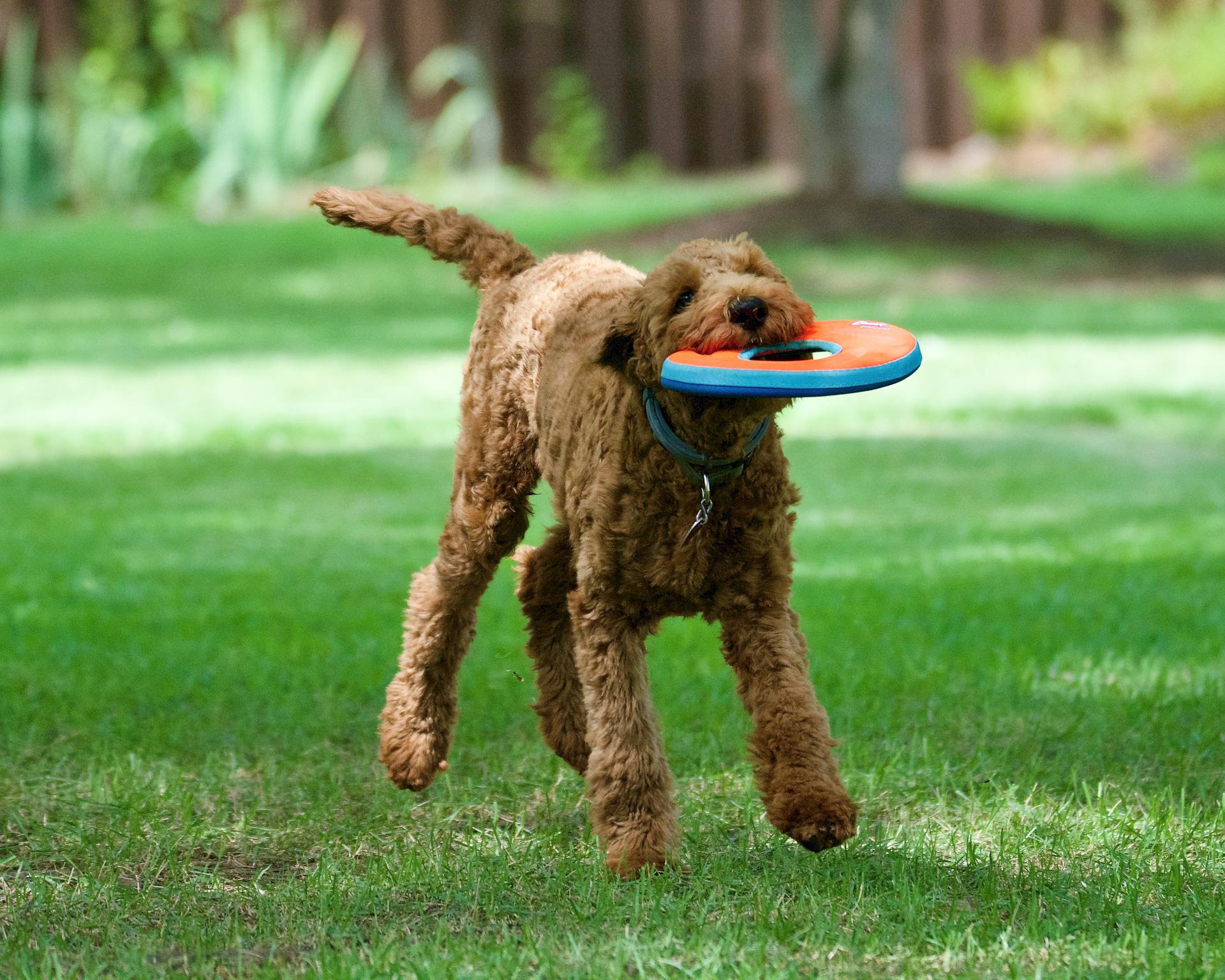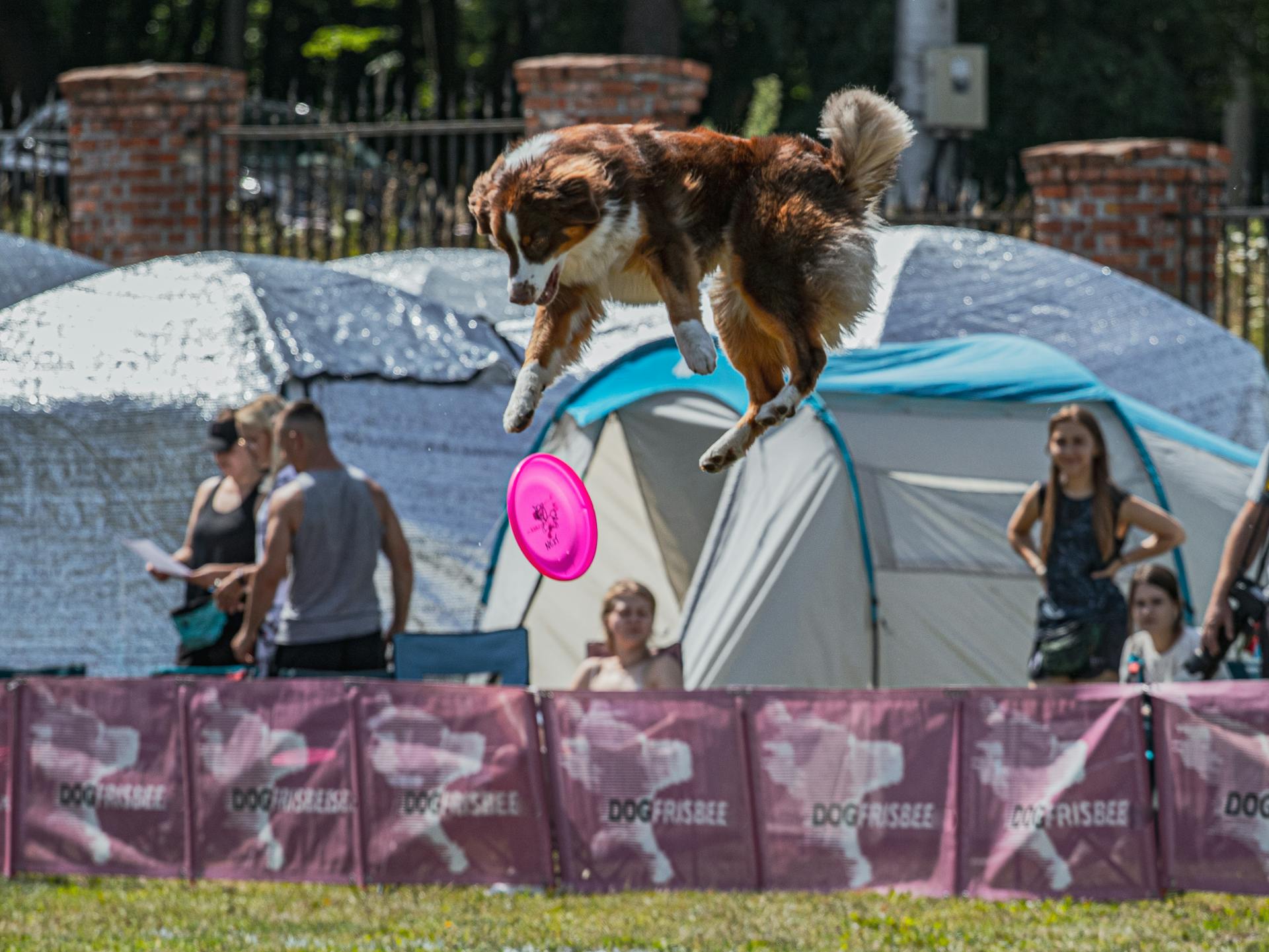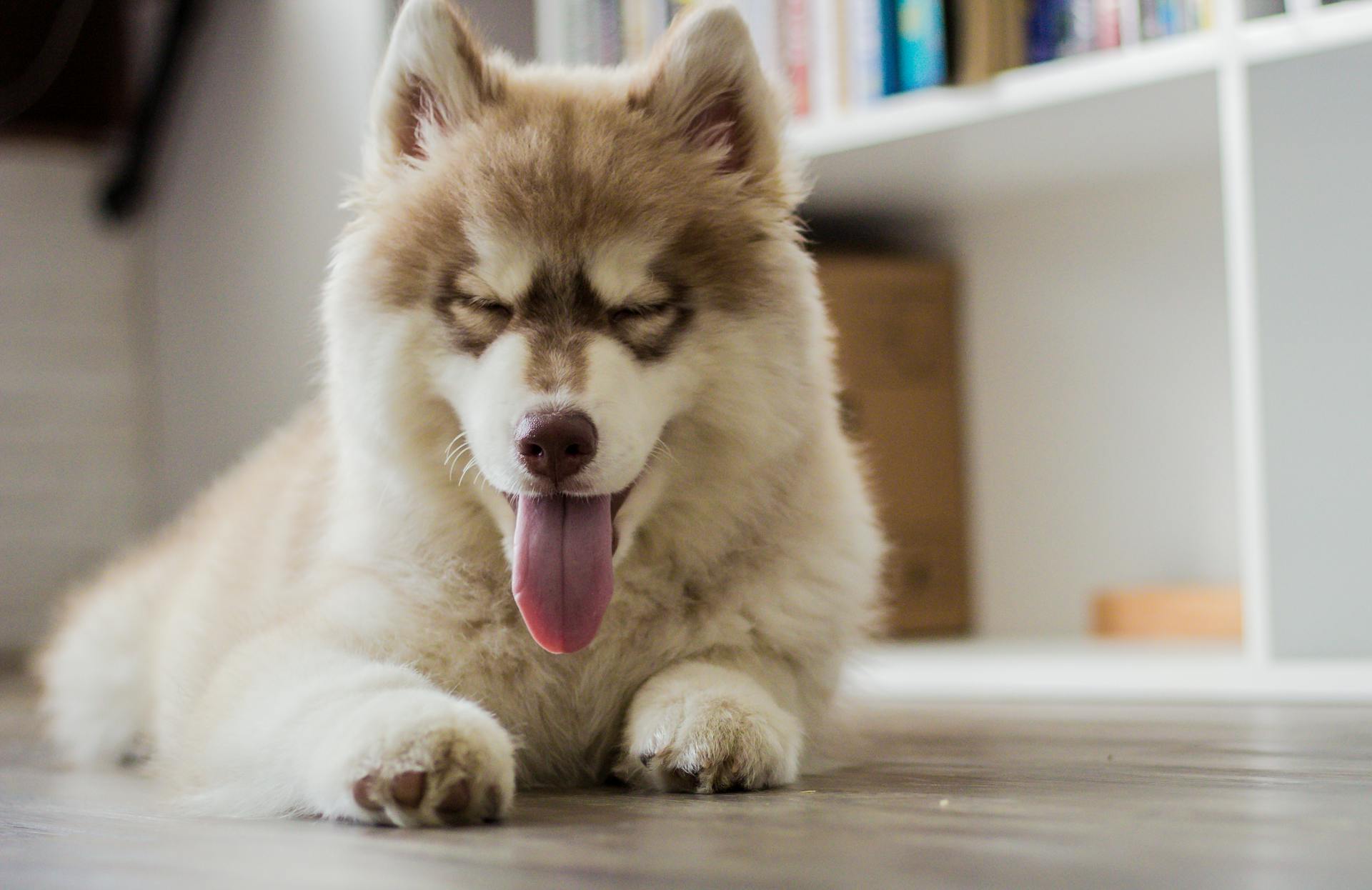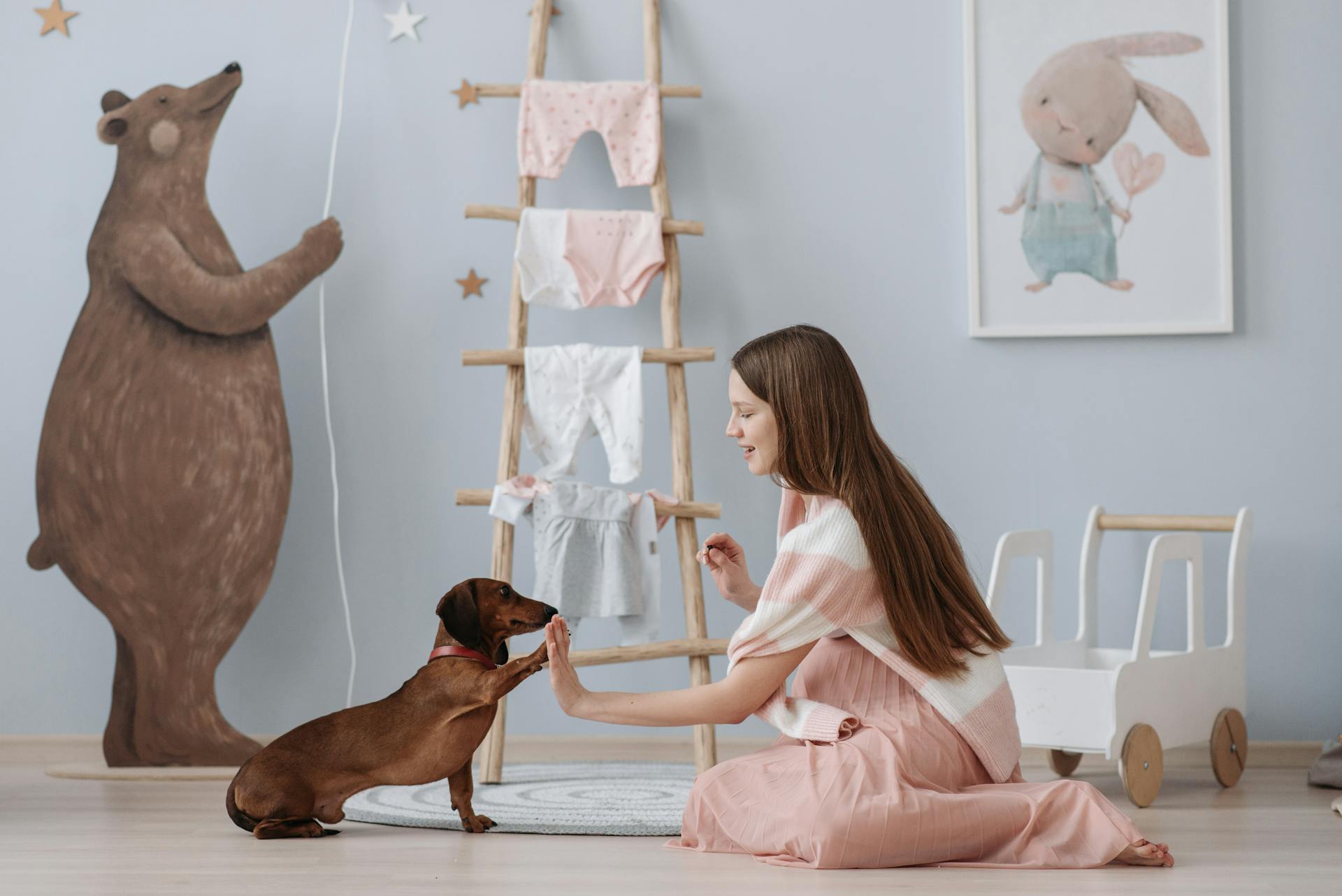
Dog frisbee training is a great way to mentally and physically stimulate your furry friend, and it's easier than you think to get started. The key is to have patience and consistency.
First, choose a quiet area with minimal distractions where your dog can focus on the frisbee. A park or open field is ideal. Make sure your dog is at least six months old and has basic obedience skills.
Start by introducing the frisbee to your dog, letting them sniff and explore it at their own pace. This will help them become familiar with the object and associate it with positive experiences.
Getting Started
Getting started with dog frisbee training is an exciting time, and it's essential to have the right equipment. Special frisbees or throwing discs designed for dogs are a must-have, as they are made from softer materials and are less likely to cause injury to your dog.
You'll also want to start with a young dog and use training frisbees made from fabric and rope, which resemble toys your dog may already have. These are perfect for getting started with a young dog.
For your interest: How to Discipline a Dog for Getting in the Trash
Don't leave your dog unsupervised with throwing discs, as they can come apart and injure your dog. Make sure your dog is healthy before teaching him to catch a frisbee and has no joint issues that could become aggravated by exercise and jumping.
Use a leash and treats when teaching your dog to catch a frisbee to control your dog out in the open when necessary, and to reinforce successful catching behavior.
For more insights, see: How to Teach a Dog Obedience
Basic Catching
Start by getting your dog interested in the disc, most dogs don't naturally track flying objects, so you'll need to teach them through play. You can roll the frisbee to chase it down and grab it like they would chase a bunny or a squirrel.
To begin, have your dog sit a few feet in front of you and show them the frisbee. Throw the frisbee in the air in front of them, saying a release command at the same time. This may take several tries, but eventually, your dog will come to expect the throw and catch the frisbee.
Gradually start tossing the frisbee for your dog to retrieve, at first, they may only catch it on the ground. Continue to practice holding it in your hand above for them to jump up and grab.
Make it a fun game of back and forth play, growing your dog's focus on you and the game. Over time, you can slowly replace doing a "take and tug" with a little toss up of the frisbee.
Start Shaping Catching
Start shaping catching by gradually tossing the frisbee for your dog to retrieve. At first, he may only catch it on the ground.
You'll need to practice holding the frisbee in your hand above your dog's head for him to jump up and grab. This will help him learn to track the frisbee in the air.
When your dog catches a frisbee in the air, throw a big treat party with lots of excitement and praise. This positive reinforcement will help him associate catching the frisbee with a reward.
On a similar theme: Sit Means Sit Dog Training Bel Air
You can start by having your dog sit a few feet in front of you, then show him the frisbee and throw it in the air in front of him. Say a release command at the same time, such as "Ok!" or "Go!".
Some training frisbees are made from fabric and rope and are good for getting started with a young dog. These resemble toys he may already have.
You'll need to practice lightly tossing the frisbee each time you practice, and eventually, your dog will come to expect the throw and catch the frisbee.
Teaching Catching
Teaching catching is a crucial step in dog frisbee training. It's essential to start with small steps and gradually increase the difficulty level to avoid frustrating your dog.
To begin, you can teach your dog to grab the frisbee from your hand. Hold the frisbee horizontally to the ground at the height of your dog's mouth, and let them grab it while you're still holding on. Say "drop it" and take the frisbee from their mouth immediately.
You can also start by teaching your dog to run and grab the frisbee. Hold the frisbee at the height of your dog's mouth while moving your body in a circle away from them. As your dog grows, you can stand up while doing this exercise.
Here's a simple progression to follow:
- Teach grabbing
- Teach running and grabbing
- Teach jumping and grabbing
- Advance to mid-air catches
Remember to praise and reward your dog with treats and affection throughout the process. With patience and consistency, your dog will learn to catch the frisbee in no time!
Defining Tasks
Catching a frisbee is a great way to spend time with your dog, giving them cardiovascular exercise and building muscle. It's also a fun way to create a team relationship with your pet.
To catch a frisbee, your dog will need to be very focused on the disc so that they can track it in the air and then mark the best moment to leap up and grab it. This requires a lot of concentration and practice.
Labrador Retrievers and German Shepherds are both suited for catching frisbees, but it's essential to wait until your dog is fully developed and in good shape. Young dogs, especially those with developing skeletons and musculature, should not be subjected to the stress of frisbee catching.
Throwing, catching, and retrieving are the three skills involved in catching a frisbee. A disc that hovers in the air will be easier for your dog to catch than one that's thrown with a lot of force.
Some owners teach their dogs to release the frisbee on command, while others have another disc available so that their dog will drop the first one to retrieve the second. This helps to make the activity more enjoyable and challenging for your dog.
A different take: Will Neutering a Dog Help with Aggression
Teach Catch It
To teach your dog to catch a frisbee, you'll want to start by teaching them to grab the disc from your hands. This is a crucial step in the process, and it's essential to do it correctly. Begin by holding the frisbee in your hand and saying "catch it" to encourage your dog to grab it.

As you practice, lightly toss the frisbee each time to help your dog develop their catching skills. This will help them learn to track the disc in the air and develop their coordination.
Remember to praise your dog and reward them with treats and affection when they successfully grab the frisbee. This positive reinforcement will help them associate catching with good behavior.
Here's a simple 3-step process to teach your dog to catch a frisbee:
1. Hold the frisbee in your hand and say "catch it"
2. Lightly toss the frisbee and encourage your dog to grab it
3. Praise and reward your dog with treats and affection when they successfully catch the frisbee
Here's an interesting read: 3 D's of Dog Training
Throwing and Release
To throw a frisbee with your dog, you'll want to start by getting the right equipment. Human frisbees can be too hard for your dog, so look for a dog frisbee specifically designed for canine use, such as the Hyperflite Jawz or Aerobie Dogobie.
For the best results, choose a brand like Hyperflite, Hero, or Aerobie, which are designed to reduce the risk of injuring your dog. You can also consider a soft fabric disc like the Flippy Flopper or the Kong Flyer.
To get your dog excited about the frisbee, associate it with positive things, such as treats or praise. Then, start by throwing the frisbee so it rolls on the ground, allowing your dog to transition from fetching a ball to retrieving a disc.
Practice Release
To practice release, you need to teach your dog how to let go of the frisbee on command. Just take the frisbee and flip it on its side while on the ground, letting your dog know how to pick up the object.
This technique helps your dog learn to release the frisbee, which is an essential part of the game. Your dog will understand that the game continues even after dropping the frisbee.
Here's a simple way to reinforce releasing the frisbee: ask your dog to release the frisbee and say "let go". Hold a second frisbee out to encourage your dog to drop the first one.
By practicing release, you'll be able to teach your dog to let go of the frisbee on command. This will make the game more enjoyable for both you and your dog.
Intriguing read: Training Dog to Ring Bell to Go Out
Throwing
Throwing is a crucial part of the throwing and release process, and it's essential to do it correctly to avoid injuring your dog.
Use a dog frisbee specifically designed for canines, as human frisbees can cause harm. Look for brands like Hyperflite, Hero, or Aerobie, which offer a range of discs suitable for different dogs.
To get your dog excited about the disc, associate it with positive experiences. You can do this by making the disc a reward or a fun toy.
Throwing "rollers" is a great way to help your dog transition from fetching a ball to retrieving a disc. This involves throwing the disc on the ground, allowing it to roll like a wheel, and encouraging your dog to chase it.
Start with short, slow throws and be careful not to hit your dog with the disc. It may take 100 or more throws before your dog learns to grab the disc out of the air.
Here are some tips for throwing the disc safely and effectively:
Tips and Safety
Patience is key to success when training your dog to play frisbee. Remember that all breeds and all sizes of dogs can become disc dogs, so don't be discouraged if your dog is small or has a different breed.
To prevent injury, take a minute or two to warm up your dog and get their muscles going. You can do this by teaching them a few tricks, such as leg weaves or doing a scoot, or by doing short throws with your dog.
If your dog puts holes in the discs quickly, get Hyperflite Jawz discs, which are designed to withstand rough play.
Protecting from Injury

Warming up your dog before playing frisbee is a great way to help prevent injury.
Take a minute or two to warm up your dog and get their muscles going, it's a simple yet effective way to keep them safe.
Doing leg weaves, scoots, and little switches or turns are all great ways to engage your dog's muscles and get them ready to play.
Short throws with your dog are also a great way to warm them up and get them moving.
Learning how to throw better for your dog can also help prevent injury, by throwing lower line drives that don't require them to jump high.
Meeting up with an animal chiropractor or certified animal massage therapist can also be beneficial, as they can help work out kinks and suggest excellent stretches for your dog.
Doing stretches after playing can also help prevent injury and keep your dog healthy and happy.
If this caught your attention, see: Great Dane Dog Training
Tips
Patience is key to success when training your dog to be a disc dog. This is especially true when you're just starting out and things might not go as smoothly as you'd like.

All breeds and sizes of dogs can become disc dogs, so don't worry if you have a small or large dog - they can all learn to play this fun game.
If your dog is putting holes in the discs quickly, it might be worth considering switching to Hyperflite Jawz discs. These are designed to withstand even the toughest chewers.
Frequently Asked Questions
Is frisbee good exercise for dogs?
Yes, playing frisbee with your dog is a great way to provide physical exercise and improve their motor skills. It offers a fun and efficient cardio workout that's perfect for active dogs.
How do you start disc training a dog?
To start disc training a dog, begin by using the disc as a bowl for treats and then progress to playing with it as a toy. Next, try the "Roll and Retrieve" method, where you roll the disc and reward your dog with treats and praise when they bring it back.
What age can dogs play frisbee?
Dogs can start playing frisbee around 14 months old, but consult with your vet first. Soft and flexible frisbees are best for beginners
Sources
- https://wagwalking.com/training/train-a-german-shepherd-to-catch-a-frisbee
- https://www.tailsofconnection.com/trendingblog/how-to-train-a-dog-to-catch-a-frisbee
- https://www.wikihow.com/Teach-a-Dog-How-to-Catch-a-Frisbee
- http://www.dogmamablog.com/2018/03/04/teach-frisbee-tricks/
- https://wagwalking.com/training/catch-a-frisbee
Featured Images: pexels.com


